- Home
- Farley Mowat
The Curse of the Viking Grave Page 8
The Curse of the Viking Grave Read online
Page 8
When he finally sat down one of the women gave him a big mug of tea, and Peetyuk shook his white friend’s arm and said, “Jamie, you are Inuk—an Eskimo. All people say you best singer in our country. Maybe you marry Eskimo girl and stay here, eh? Make very famous man!”
Whatever reservations and tensions the three strangers felt when they arrived had now completely dissolved. Even Angeline, who had been very silent, watching everything with careful eyes, had relaxed. She was now sitting beside an Eskimo girl of her own age, the two of them fingering and comparing each other’s clothing, although they did not have a word in common. Occasionally she glanced at Peetyuk, half shyly and half proudly, for she was thinking to herself how much a man he seemed now that he was with his own people. Once Peetyuk caught her glance and returned it with a broad smile of delight, and Angeline felt very happy and content.
Well before midnight the visitors had begun to feel sleepy. But the party was not yet over. One by one the Eskimo women, and finally even the children, took the drum and sang their own songs. Kettles and trays of boiled and roasted deer meat began to appear. The tea continued to flow like a running river. Some of the women and men began making cat’s cradles—string figures—with their fingers.
Eventually Jamie could keep his eyes open no longer. He began to drowse, and Kakut, seeing this, spoke up in his gruff voice. The hubbub ceased. People began to file quietly out of the tent and it was soon empty except for the four travelers, Kakut, his wife, and their grown son Bellikari.
“Now we sleep,” Peetyuk said to his friends. “All sleep at back of tent under tuktu robes.”
Too sleepy to be bothered by the lack of privacy, Jamie and Awasin shrugged off their outer clothing and crawled in. Peetyuk followed, then Kakut and Bellikari. Angeline and the Eskimo woman snuggled into their own corner of the communal bed. The last fat lamp flickered and went out and there was silence in the camp of the Ihalmiut.
CHAPTER 10
Innuit Ku
EXHAUSTED BY THE TREK NORTHWARD and by the late night, the boys and Angeline slept so soundly they did not waken until the morning was well along. When they came crawling sleepily out from under the robes it was to find the big tent deserted. Pulling on their clothing, they went outside.
The scene which met their eyes was one of monumental confusion. People were running about in all directions, carrying loads here and there, dragging dogs toward sleds, shouting, laughing, and generally getting in one another’s way. Children raced around amongst the older people, pursuing fleeing dogs. Where five tents had stood the night before now there was only Kakut’s. The rest were reduced to bundles of sticks and mounds of deer hides.
“What on earth’s happening?” Jamie asked Peetyuk.
“We go my mother’s camp today,” Peetyuk explained. “All people come along. Time to leave small camps, go Innuit Ku for big camp. Soon ice gone then deer not able walk all over plains. Must cross rivers at narrow places. People go there, make big hunt with kayaks.”
Kakut joined them, and at his gesture they followed to where his wife was tending a small fire of moss and twigs. A big iron kettle hung over it, simmering and hissing. The Eskimo woman smiled a greeting, then dipped out chunks of boiled meat which she handed to them without benefit of plates. The meat was hot, and Jamie was soon juggling his piece from hand to hand.
“This is what I call a breakfast on the run,” he mumbled as he burned his lips on the meat. “But good, mind you,” he hastened to add as Peetyuk threw him a sharp look.
Awasin grinned. “You were not so fussy last winter when we lived at Hidden Valley. I think you ate your breakfast with your fingers there—and raw sometimes.”
“I could get our tin plates from the cariole,” Angeline suggested.
“No, sister,” Awasin told her. “These people do not use plates. We should not make them feel the lack by using ours.”
Breakfast did not take long, and soon the boys were wandering about the camp with Peetyuk as their guide. They looked with keen interest at the dogs: magnificent big beasts which were nearly twice the size of woodland huskies, and strikingly patterned in black and white. Awasin was curious to know why the Eskimos did not keep their dogs tied when not in use. He also commented on their good nature.
“That why we not tie,” Peetyuk explained. “If you are dog tied up all time, you get mean. Eskimo dog free like Eskimo. So he be happy like Eskimo.”
The boys also admired the sleds, which although built like Peetyuk’s were much larger. Kakut’s sled was twenty feet long, composed of two massive runners joined by a dozen short cross-pieces lashed across the top. Jamie whistled when he saw the size of this sled and the enormous load which had been piled on it. He was frankly skeptical that it could ever be moved by dog power, but his skepticism vanished when Kakut and Bellikari hitched up their team of eighteen dogs. These were not hitched one behind the other in forest style. Each was on a separate trace so that the whole team could spread out fanlike ahead of the sled.
The last thing to go on Kakut’s sled (his tent had already been pulled down and packed by Bellikari and his mother) was a strange-looking object some fifteen feet in length. It consisted of an open latticework of very small curved willow ribs, fastened with rawhide to a number of long stringers of thin spruce. It looked like the skeleton of some gigantic fish.
“Kayak,” Peetyuk explained as he noticed Awasin’s interest. “When we come Innuit Ku, Kakut get deer hides and cover kayak. Then float very good.”
A shout from Kakut drew everyone’s attention. His big sled now stood ready to go and one by one the other Eskimo men drove their sleds over to join him. Old women and young children sat on top of the loads, but the younger women and older children (packing bundles on their backs) prepared to walk alongside. Some of them had hung pack-saddles on half-grown dogs which were still too young to work in the sled teams. Some young dogs were towing miniature travois consisting of two long poles stretching out behind, on which a small platform bearing a light load had been lashed. Five or six even younger dogs—hardly more than puppies—frolicked free amongst the sleds and people.
It was a gay scene, but with a wild and ancient look about it. The mob of fur-clad people, the howling dogs, the great sweep of rolling tundra under a white spring sky were things which had not changed through many centuries, perhaps not for many millennia.
The boys and Angeline, with their teams, joined Kakut. The old man gave the signal to move off by cracking an immensely long whip over his dogs’ heads. In a moment the whole cavalcade was moving.
Progress was slow, for there was already much open ground. The sleds moved at the pace of the walking women and children; but no one seemed concerned. There was much joking back and forth, and when one of the younger men, attempting to show off his dog-driving skill, incautiously drove over a piece of bad ice and plunged through to his neck, the whole assemblage stopped to howl and rock with merriment. It was laughter in which the victim himself was quick to join, once he had scrambled back onto firm ice and changed into dry clothing.
The destination was only eight miles away, but it was nearly dusk before the caravan reached Kakut Lake and came in sight of the tents of a camp. Everyone in this new camp was out on the ice to greet the visitors. Once more Jamie, Awasin and Angeline had to go through the welcoming ceremony, including another gigantic meal, which this time was served in the tent of Epeetna, Peetyuk’s mother.
Epeetna was still a young woman and good-looking, if somewhat plump. She lived with her married brother Ohoto—Peetyuk’s uncle—who was a powerfully built, stocky man in his mid-thirties. When Ohoto saw Peetyuk he caught him in a bear-hug, lifted him clean off the ground, and carried the red-head, yelling and kicking, up to his mother’s tent where Epeetna greeted her son with a rub of noses and much back-patting.
Kakut’s group pitched no tents but simply moved in with friends in the new camp. This led to some crowding, since there were nearly forty men, women and children all told and only fou
r tents. But no one seemed to mind, and there was another late party that night with the whole population crowded into a single tent. Despite their desire not to offend anyone, this was too much for Awasin, Jamie and Angeline and they managed to sneak away to their carioles, where they were preparing to get out their sleeping robes when Peetyuk and Ohoto descended on them.
“What you do?” Peetyuk cried indignantly. “My mother think you not like. Go very sad. All Eskimos go sad. Come back to tent, eh?”
Awasin and Jamie exchanged glances. Jamie shrugged. “Nothing else for it, chum,” he whispered. Then: “We just came down to get our robes, Peetyuk. We were coming right back.”
Peetyuk snorted. “Robes! No need robes. Plenty people on sleeping bench, keep everybody warm!”
“Uh-huh; that’s what I was afraid of,” Jamie muttered, but Peetyuk did not hear him.
It was a night Jamie long remembered. There were nine people on the sleeping ledge. The snores, grunts, groans and whistles would have done credit to a boiler factory. Not only that, but several of the Eskimos were almost as athletic when asleep as when awake. Feet in his ribs, elbows in his ear, and once a large hand over his mouth kept Jamie from being bored. Angeline fared a little better for the women were quieter sleepers, but even she looked weary and hollow-eyed when morning finally freed them from the communal bed.
Once again they were treated to the sight of a camp being broken, since the Kakut Lake families had decided to join the rest in the trek to the Kazon River.
“We gather people like a snowball rolling downhill,” was Jamie’s comment to Awasin and Angeline.
Angeline looked very thoughtful. “That is so, Jamie. I wonder how many will there be in bed tonight?”
“I hate to think!” said Jamie, shuddering.
But they were lucky. The next camp was at the north end of Kakut Lake, and when they reached it they found it had been broken up the day before and its people had gone on. Consequently, everyone slept out that night, and even Peetyuk seemed grateful for fresh air and space, and for the privacy of his own robes.
Just before noon the following morning the straggling line of sleds and people crossed the strip of land beyond Kakut Lake and reached the high cutbanks of Innuit Ku. To Jamie and Awasin the moment was one of some solemnity, for this was their return to the big river which the previous year had carried them north to the great adventure of their lives.
Innuit Ku was not as they had seen it last. It was ice-covered now, but the thaw waters had broken the ice loose from shore and had risen under it until the huge cakes were cracking and splitting and almost pushing over the edge of the banks. From beneath this uneasy layer of ice came a deep-throated roar of barely contained waters.
“That ice will go out anytime,” Awasin said in awe. “I do not want to be on it when it goes!”
But there was no question of traveling on the river, and Kakut led his procession north along the eastern bank. About noon he called a halt and everyone scattered to gather fuel for a tea fire.
Jamie and Awasin went inland to collect willows, leaving Angeline and Peetyuk to get out the grub. Suddenly they felt the frozen ground tremble under their feet. At the same instant there came a dull, reverberating roar, and even as they looked at each other with startled eyes it rose to a tremendous clashing thunder.
“The river!” Awasin yelled, and the two boys turned and ran toward the travel camp.
They arrived in time to watch a fearsome spectacle. The flood waters building up along hundreds of miles of lakes and rivers were throwing off their chains. The whole surface of the river was in agony. Gigantic cakes of ice lifted, twisted, slipped and crashed as they began to tear apart and move shudderingly downstream. Then, from upstream, a wall of ice and water fifteen or twenty feet high appeared and came roaring down toward the watchers.
Clutching Angeline against him, Awasin watched wide-eyed as the mighty battering-ram of ice and water swept down toward them. Jamie’s lips moved as he shouted something, but nothing could be heard above the cataclysmic crash of ice and rocks and water. The flood wave came abreast of them and they saw blocks of ice ten feet in thickness flung high into the air to fall in great gouts of spray and shattered ice. Ice crystals glittered and shimmered above the unleashed power of the raging river like a jeweled fog.
No one moved during the half hour that it took for the flood to subside a little. When at last Kakut called on them to make their fires and to eat their meal, even the Eskimos went about their business in a subdued silence.
“Winter dead,” Peetyuk said as the four sat drinking their tea. “Now good time for Eskimo people begin. Look. Tingmea come now!” He pointed to the sky where a long, ragged “V” of geese was following the course of the river northward.
The cavalcade continued to make slow progress. Much open rock and thawing bog had appeared from under the receding snows, and the dogs were hard put to haul the sleds along. Often they had to be helped by shouting Eskimos who grabbed the traces and pulled as hard as the dogs themselves. It was late afternoon before they came in sight of a cluster of tents pitched on the east shore of a lakelike expansion of Innuit Ku.
This was the site of the central summer camp. Here the Ihalmiut usually gathered to intercept the buck caribou who traveled north some days after the passing of the does. With the arrival of Kakut’s cavalcade there were twelve families of Eskimos, totaling about sixty people in all. These were the last survivors of what had once been a great population spread far and wide across the northern plains.
These were the people of Innuit Ku, the River of Men, which had once known their camps along more than four hundred miles of its sinuous length. They were the last of the People, for the River of Men had become the River of Ghosts, and the mighty land was almost empty of mankind.
CHAPTER 11
Elaitutna
DURING THE NEXT FEW WEEKS THE boys and Angeline remained at the Eskimo camp. Although the rivers had broken up, they were still full of floating ice and could not yet be used as canoe routes. The spring thaw, which comes so swiftly to the arctic plains, had turned the country into a morass of melting snow, swollen lakelets and sodden muskeg, so that overland travel was also out of the question for the time being.
Although the travelers were impatient to reach the Viking cache, they did not find the enforced delay difficult to endure. Life with the Eskimos was full of interest.
Jamie and the two young Crees soon felt at home amongst the Ihalmiut, but all the same they insisted on erecting their own tent. Eskimo hospitality, as they had found, was apt to be a little overwhelming. However, they ate many of their meals with the people, and they were in great demand as guests.
The Eskimo diet consisted almost entirely of deer meat, cooked in a variety of ways and sometimes eaten raw. During the first days of the visit, deer meat was in short supply, since without ammunition the Eskimos had not been able to kill many of the migrating does. However, on the second day at the Innuit Ku camp, Peetyuk led Jamie and Awasin off on a hunting expedition, and when they returned late that day, having killed six fat deer, they were greeted as mighty hunters. These deer were particularly welcome since the Eskimo men were anxious to get their kayaks covered in preparation for the arrival of the bucks and good deer hides were scarce.
Jamie and Awasin watched with keen interest as Kakut prepared his kayak. First he soaked the fresh hides in the river for two days, then he scraped both sides, removing the hair and the fat. The resulting parchmentlike skins were moistened again and carefully stretched over the skeleton of the kayak, and the hides were stitched tightly together by three women. This stitching, done with sinew and bone needles, was so fine that the finished seams were completely waterproof.
As the skins dried they shrank, so that the kayak covering was stretched as tightly as a drumhead.
One morning Kakut decided to test his kayak. He picked it up easily—for it weighed almost nothing—carried it to the edge of the lake and laid it carefully on the water, wher
e it floated as high and as light as a pinch of thistledown. Wading out alongside it, Kakut nimbly swung himself into the tiny cockpit, picked up his long double-bladed paddle, and shot off over the lake.
It looked easy, and when Peetyuk slyly intimated to Awasin that only an Eskimo could handle a kayak, Awasin incautiously took up the challenge and agreed to try his skill.
Peetyuk quietly spread the word around the camp, and when Awasin went down to the shore he discovered to his dismay that almost all the Eskimos had gathered to watch him. Trying to ignore the expectant mob, he launched the kayak and, having drawn on a pair of skin boots—kamikpak—which came above his knees and were quite waterproof, he waded out.
Getting into the kayak proved harder than it looked. On his first attempt he tipped the little craft over on its side and half filled it. Grimly he hauled it ashore, emptied it, and prepared to try again. This time, by dint of jumping into the cockpit rather than attempting to step into it, he managed to get aboard. Instantly the kayak tipped to the left, almost spilling him out.
Jamie, Peetyuk and the Eskimos were vastly entertained. Shouts of laughter and of good-natured advice rained down on poor Awasin as he fought to get the skittish little boat under control. Finally he got it balanced and took a stroke with the paddle. The kayak shot ahead so fast that Awasin’s mouth fell open in surprise, and the watchers on shore almost convulsed themselves with mirth. Once under way, Awasin seemed unable to stop. The kayak leaped out over the icy waters of the lake with Awasin paddling for dear life as he tried to turn for shore again. Having described a huge and erratic circle, he eventually got the long, pointed bow headed for the land. But as he approached the shore he attempted to slow down by backwatering too strongly with one end of the paddle. Before he could as much as change his grip the kayak tipped right over and Awasin disappeared from view. A moment later his head popped to the surface and he began dog-paddling for shore. He had not gone a yard, however, when a look of blank surprise came over his face. His struggles ceased and he rose slowly to his feet, for the water was hardly more than knee deep.

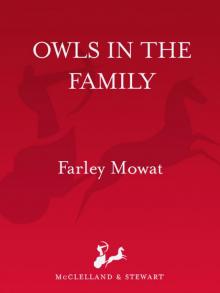 Owls in the Family
Owls in the Family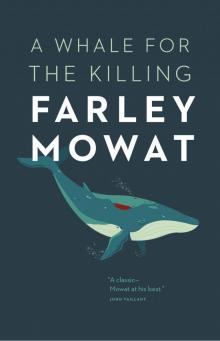 A Whale for the Killing
A Whale for the Killing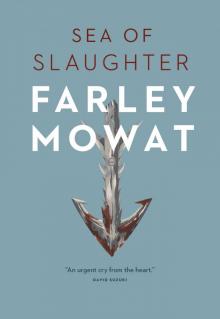 Sea of Slaughter
Sea of Slaughter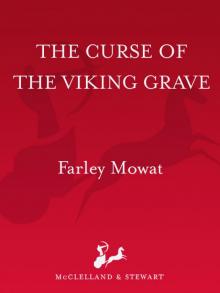 The Curse of the Viking Grave
The Curse of the Viking Grave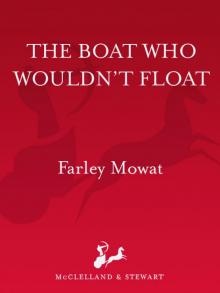 The Boat Who Wouldn't Float
The Boat Who Wouldn't Float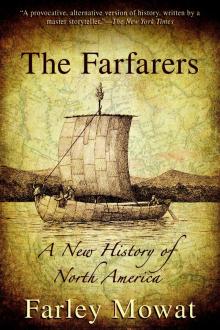 The Farfarers: Before the Norse
The Farfarers: Before the Norse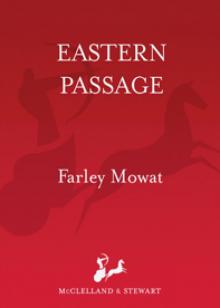 Memoir
Memoir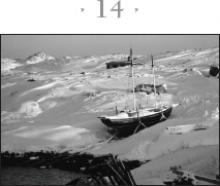 Bay of Spirits: A Love Story
Bay of Spirits: A Love Story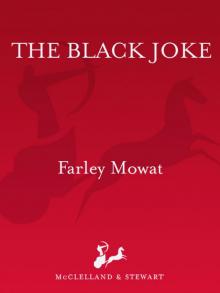 The Black Joke
The Black Joke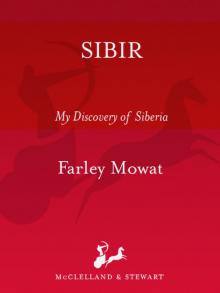 Sibir: My Discovery of Siberia
Sibir: My Discovery of Siberia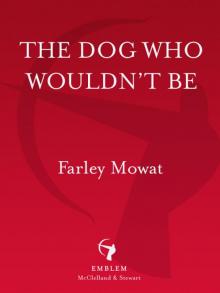 The Dog Who Wouldn't Be
The Dog Who Wouldn't Be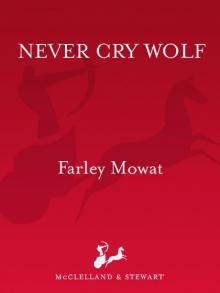 Never Cry Wolf
Never Cry Wolf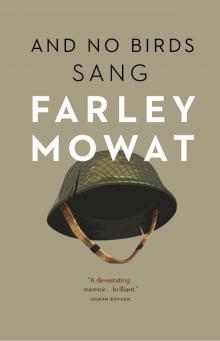 And No Birds Sang
And No Birds Sang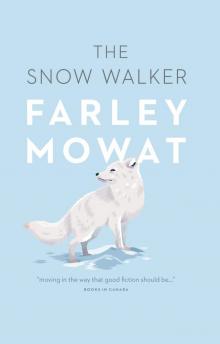 The Snow Walker
The Snow Walker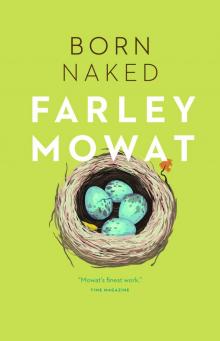 Born Naked: The Early Adventures of the Author of Never Cry Wolf
Born Naked: The Early Adventures of the Author of Never Cry Wolf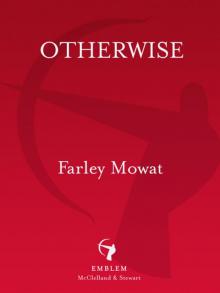 Otherwise
Otherwise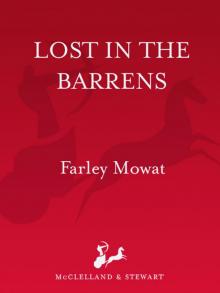 Lost in the Barrens
Lost in the Barrens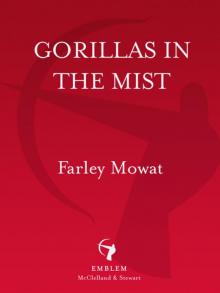 Gorillas in the Mist
Gorillas in the Mist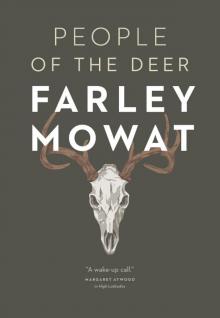 People of the Deer
People of the Deer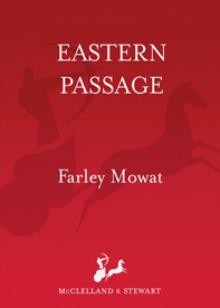 Eastern Passage
Eastern Passage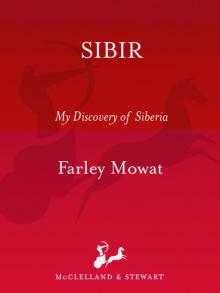 Sibir
Sibir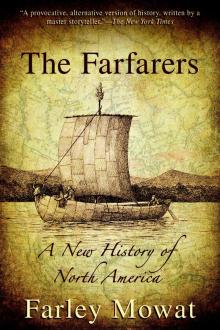 The Farfarers
The Farfarers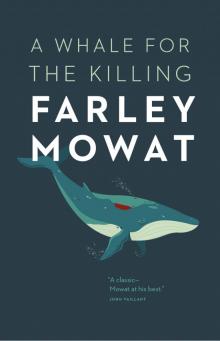 A Whale For The Killing (v5.0)
A Whale For The Killing (v5.0)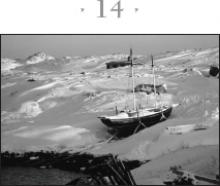 Bay of Spirits
Bay of Spirits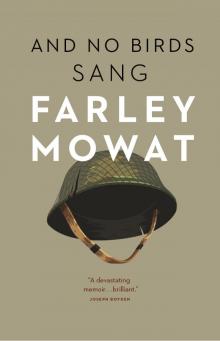 And No Birds Sang (v5.0)
And No Birds Sang (v5.0)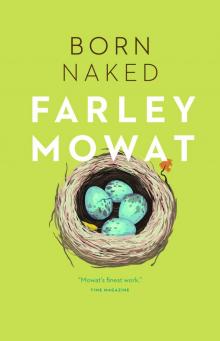 Born Naked
Born Naked